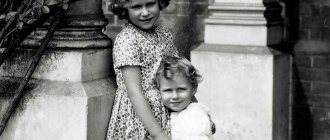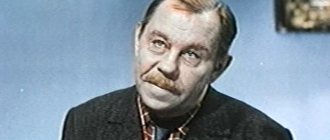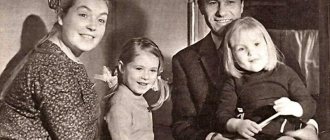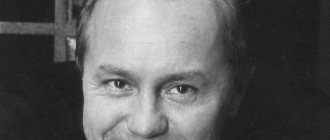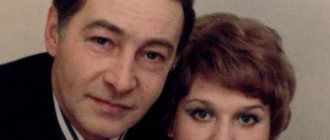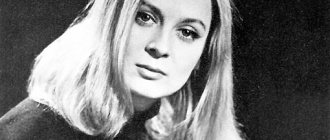Childhood
Margaret Thatcher (nee Roberts) was born on 13 October 1925 in Grantham, Lincolnshire. Her father Alfred Roberts owned groceries and took an active part in local politics and the life of the religious community - he was a member of the municipal council and a Methodist pastor, and for some time he was even the mayor of Grantham. Margaret and her sister Muriel were raised in strict traditions. Margaret Roberts studied diligently at school and attended many extracurricular activities.
Interesting Facts
In 1992, Margaret Thatcher was awarded the title of Baroness, granted to her by Queen Elizabeth II of Great Britain.
Margaret's style of government is noted in history as the period of "Thatcherism".
In 2009, the feature film “Margaret” was released about the life of the famous politician, and in 2011, “The Iron Lady” was released, which received an Oscar.
Margaret was inspired to pursue a political career by the book “The Road to Serfdom” by the writer Friedrich von Hayek. In 2007, Thatcher erected a monument (bronze sculpture) in the British Parliament.
Political career
While still a student, Margaret Roberts became chair of the Oxford University Conservative Party Association. From the early 1950s, she began to fight for a seat in parliament and in 1959 finally achieved her goal, becoming a member of the House of Commons.
She was nominated to the post of parliamentary undersecretary for pensions and state social insurance, then worked on issues of construction and land ownership, in the House of Commons she supported the retention of the death penalty and at the same time voted for the release of homosexuals from criminal liability.
In the late 1960s, she participated in the International Visits Program, through which she was able to meet with US politicians, and subsequently became a member of the Official Opposition Shadow Cabinet. In 1970, after the Conservatives came to power, Margaret Thatcher was appointed Secretary of State for Education and Science, a post she held until 1974. After the defeat of the Conservatives, Thatcher was the leader of the opposition.
Third term
And the following spring, the national union of miners called a national strike, although its chairman, Arthur Scargill, failed to get the majority of union members to approve the action.
Margaret Thatcher was not going to give up. Drawing conclusions from a similar situation in 1973, her government stocked up enough coal at the thermal power plant in advance. During the strike, there were violent clashes between picketers and police, but eventually the strike fizzled out. Many mining towns have still not recovered from the decline of the coal industry.
At the same time, in Northern Ireland, IRA militants in prison went on hunger strikes; With her tough actions, Thatcher turned even moderate nationalists against herself. And although she tried to soften tensions between Catholics and Protestants and brought the Irish Republic into the settlement, the peace process collapsed due to opposition from Unionists, that is, Northern Irishmen who wanted to maintain their territory within the United Kingdom.
In October 1984, an IRA bomb exploded in the resort town of Brighton - in a hotel where the Conservative convention was being held at that time. Four people died; many were seriously injured. A few hours later, the Prime Minister addressed the delegates. “This attack failed,” she said. “Any attempts to destroy democracy through terrorism are doomed.”
Her foreign policy was aimed at strengthening the role of the United Kingdom on the world stage, which, in her opinion, had noticeably weakened during the years of the Labor leadership of the country.
She found a close friend in US President Ronald Reagan, who shared many of her views on economics, and unexpectedly formed an alliance with Mikhail Gorbachev. “We can work together,” this phrase of hers spread around the world.
Labor, led by Neil Kinnock, could not recover from years of internal struggle, and in 1987 Thatcher - unprecedented in Britain - won parliamentary elections for the third time in a row.
First woman as prime minister
In 1979, Margaret Thatcher became the first and so far only woman to serve as Prime Minister of Great Britain. She served three terms in this post - the longest of any prime minister since 1827. She was also the first female prime minister of a European state.
In fact, it was Margaret Thatcher from 1979 to 1990 who was entrusted with solving the most important issues concerning the political course of Great Britain, since the head of government in Britain, although appointed by the monarch, performs many functions that nominally belong to the monarch.
Resignation
Thatcher made a significant contribution to the history of the country while holding the position of Prime Minister, but at the same time had a low level of trust and support from the British. However, Thatcher cared little about ratings and popular polls. The Iron Lady also ignored the positions and opinions of her party colleagues.
This approach to people led to disagreements in the team, which subsequently wanted to oust Margaret from her position. And in 1990, the majestic lady was forced to resign. A new man took her place - John Major.
For two more years after her resignation, Thatcher was a member of the House, but then decided to leave Parliament altogether. She was 66 years old at the time.
A woman with a big name found herself in writing, published several books and memoirs, but it was difficult to call her a calm pensioner. Margaret never hid her convictions, continued to criticize the authorities, the government and accuse some politicians of inaction.
"The Iron Lady"
Margaret Thatcher received this nickname for her conservative policies and tough, unbending character. Yuri Gavrilov called her the first “iron lady” in response to sharp criticism of the USSR in his article in the Krasnaya Zvezda newspaper dated January 24, 1979. At the same time, she had not yet assumed the post of prime minister.
As translated by British journalists, the “iron lady” became “the iron lady,” and this nickname was subsequently firmly attached to Thatcher.
"Betrayal with a Smile"
Immediately after this, she introduced new taxes, which sparked the most violent street protests in recent British history. Conservative MPs were alarmed: these taxes could lead to them losing their mandates. But they understood: as long as Margaret Thatcher was in charge of the cabinet, nothing could be done.
Image caption Thatcher quit politics in 1992, claiming betrayal in her own party
In 1989 she easily won a leadership contest against a little-known backbencher, but the challenge itself was just one symptom of growing discontent within the Conservative faction.
However, the last straw was the question of a united Europe.
Returning from a stormy European summit in Rome, she lashed out at her colleagues on the continent and refused to hand over more powers to the European Community, thereby infuriating many politicians.
“The chairman of the commission, Monsieur Delors, said at a press conference that he would like to see the European Parliament as a democratic body,” Thatcher said. — That I would like to see the Commission as an executive body, that I would like to see the Council of Ministers in the role of the Senate. No. No. No".
Sir Geoffrey Howe, dissatisfied with his recent resignation from the post of Foreign Secretary, seized the opportunity: he announced that he was leaving the cabinet altogether. In his speech, Sir Geoffrey left no stone unturned regarding Thatcher's policies and invited those wishing to compete for the post of party leader.
The next day, Michael Heseltine threw down the gauntlet to the prime minister. Margaret Thatchet was two votes short of winning in the first round, but she said she would fight. However, when her close advisers and colleagues, the famous "men in gray suits", whispered to her that defeat was inevitable, Thatcher announced at the next cabinet meeting that she was leaving.
“It was a betrayal with a smile on her face,” she later described with these words what happened to her.
She was succeeded by John Major, and Margaret Thatcher returned to the back benches of the House of Commons. And in 1992, when, contrary to all forecasts, the conservatives regained power, she also resigned from her parliamentary powers.
Politics Margaret Thatcher
As Prime Minister, Margaret Thatcher introduced many major reforms in a variety of areas. She sought to change what she saw as the cause of Britain's decline.
Margaret Thatcher advocated reducing government intervention in the economy (deregulation), reducing the influence of trade unions, and reducing spending on the social sector. She also carried out privatization - the sale of many state-owned enterprises, and increased taxes. This caused the decline of the mining and manufacturing industries, but marked a stage in the transition to the production of services rather than goods.
At the same time, Thatcher's economic policies were responsible for rising unemployment, although the short and victorious Falklands War contributed to her popularity. After her resignation due to a split in the Conservative Party, Margaret Thatcher remained a member of the House of Commons for two more years.
Margaret Thatcher always sharply criticized the Soviet Union; communism was unacceptable to her. However, she believed that communist and capitalist countries could coexist through mutual compromise. In foreign policy, she was guided by the United States and always spoke harshly of Soviet political leaders. only Mikhail Gorbachev “a person with whom she could deal.”
Milk Thief
In 1965, Sir Alec Douglas-Home resigned as Conservative leader and Thatcher, who had backed Ted Heath, soon became shadow spokesman on land and home ownership issues.
She launched a vigorous campaign to ensure that people on social housing were given the right to buy back their homes and flats, and harshly criticized the Labor government for high taxes.
Image caption Margaret Thatcher was the first woman to lead a British government
And in 1970, when Heath became prime minister, Thatcher received the portfolio of Minister of Education and an assignment: to cut costs in her department. She took up the cause energetically, and one of the results of this was the end of the government's subsidy of free milk for schoolchildren aged 7 to 11 years.
Labor members who found themselves in opposition waged a fierce fight against this and gave her the rhyming nickname Margaret Thatcher, milk snatcher (Margaret Thatcher is the milk snatcher).
At the same time, at government debates, she herself spoke out against the abolition of free milk. “I learned a valuable lesson,” Thatcher later wrote. “For a minimum of political gain, I received a maximum of political shame.”
Thatcher denied rumors circulating at the time that sooner or later she might lead the government, and in one television interview she even expressed doubt that a female prime minister would appear in Britain in her lifetime.
Heath's government did not last long. Forced by the 1973 oil crisis to introduce a three-day working week in the country and faced with massive miners' strikes, the cabinet collapsed in February 1974.
Personal life
her husband, businessman Denis Thatcher , back in 1949. They met at a dinner to celebrate Margaret's official confirmation as the Conservative Party candidate in Dartford. In 1951 they got married, and in 1953 twins Carol and Mark were born to this marriage.
Denis Thatcher was 10 years older than Margaret, and this was his second marriage. By coincidence, Denis Thatcher's first wife was also named Margaret.
Margaret and Denis Thatcher were married for many years. In her autobiography, Margaret wrote that without the support of her husband, she would never have become prime minister. After her resignation, Denis Thatcher received the title of baronet, and Margaret Thatcher, accordingly, became a baroness.
Denis Thatcher died in 2003; his famous wife survived him by 10 years.
Falklands War
Dissatisfaction with the Iron Lady’s harsh methods was expressed not only by the opposition, but also by representatives of her own party. There were occasional riots in city neighborhoods. However, the Prime Minister refused to back down.
Image caption The Falkland Islands War was a severe test but also ensured Thatcher's election victory
“To those who are waiting with bated breath for that favorite word of the press - reversal - I will say only one thing. You turn if you want. And the lady won’t fold,” she said at the Conservative convention in 1980.
By the end of 1981, her rating had fallen to 25% - the lowest point ever recorded by any prime minister in British history at that time. But the point of no return has been passed. Early next year, the economy began to recover—and with it, voters' love for Margaret Thatcher.
Her popularity reached its peak in April 1982, when the prime minister reacted decisively to the Argentine army's invasion of the Falkland Islands. Thatcher immediately sent a naval squadron to the archipelago, and Argentina capitulated on June 14.
The victory in the Falklands, combined with discord in the ranks of the Labor Party, then led by Michael Foot, ensured Conservative triumph in the 1983 parliamentary elections.
Party leader
The 70s were difficult for the economy and domestic situation in Great Britain. In the post-war period, the country began to move backward in its development and was no longer even included in the top ten leaders, although it had always been at the forefront.
In 1974, the question of choosing the head of the Conservatives was raised. Margaret Thatcher announced her candidacy, becoming a rival to the current leader E. Heath. The elections shocked him: out of 276, 130 votes were cast in favor of Thatcher and only 19 for Heath, after which he withdrew his candidacy. But instead of him, Margaret had new rivals. The most serious of whom was Whitelaw. The second round of elections was held on 02/11/1975, which reflected Thatcher’s undoubted advantage: 146 elected representatives of the people voted for her, while Whitelaw received 79 votes.
It was a very difficult time for the conservatives; they were defeated twice in parliamentary elections, the number of party members fell sharply, and a party crisis ensued. It was clear: the party needed “new blood.” And Thatcher, like no one else, coped with this difficult mission.
Thatcher's reforms and achievements
Margaret herself did not call herself a woman - she said: I am a politician, and a politician has no gender. She showed courage where men lacked it.
It was under her that the conflict in the Falkland Islands with Argentina was unleashed. Great Britain and specifically Thatcher showed their determination in this matter by sending troops there, after which Argentine forces were forced to leave the islands. This small war became another political victory for the Iron Lady. By the way, the Russians gave her the nickname itself. In her own country, Margaret was called much less poetically for her unyielding character, for example, “Battering Ram” or “Armored Tank.”
It is interesting that it was under Thatcher that the rapprochement between Great Britain and the USSR took place, and M. Gorbachev and his wife were on a government visit to London. Margaret called her Soviet colleague “Gorby” and on many issues they were in agreement, although there were differences.
The reforms initiated by the Iron Lady boiled down to three main postulates:
- tax reduction for big businesses;
- privatization of public sector facilities;
- a significant reduction in the wage fund.
The latter, of course, was extremely unpopular with the majority of people, but played a positive role in the country’s fading economy.
The problem of Ulster was of no small importance in those years. Margaret Thatcher showed deep political wisdom, calmness, but at the same time remarkable determination. She offered to grant Ulster (Northern Ireland) independence from England if a referendum showed that the majority of the population would vote for this decision. However, this was not destined to come true: as a result, Ulster is under the auspices of the United Kingdom to this day. It should be noted that the IRA (Irish Republican Army) even organized an assassination attempt on the prime minister by detonating a bomb, but Margaret was not harmed, unlike other figures of the Conservative Party.
"Thatcherism" in politics
This term refers to the attitudes that were characteristic of Margaret Thatcher in ideology, morality, and politics. She tried to implement them when she was prime minister.
Its main characteristic can be called the “right to inequality.” The politician argued that it is human nature to move towards something good, better than what he currently has. Thatcher advocated free enterprise and initiative for profit. However, at the same time, she condemned the “passion for money for money’s sake.”
For Thatcherism, equality is a mirage. And the right to inequality, in turn, pushes a person to stand out, improving himself and improving the quality of his own life. That is why she did not condemn wealth, but, on the contrary, called on all citizens of the country to make efforts to increase it in order to further improve the standard of living.
Father is ideal for Margaret
Alfred had an elementary education, but was distinguished by his thirst for new knowledge, as a result of which he did not spend a day without reading. He instilled this quality in his daughter. They went to the library together and borrowed two books for a week with the goal of reading them one at a time.
It was her father who instilled in little Margaret the quality of being different from everyone else. He instilled in her that a person should “lead” and not be “followed.” To do this, it was necessary to work day after day, thinking about the future and about one’s position in society. Alfred repeated many times: you don’t need to act just because others are doing it.
Her father was her ideal; little Margaret believed that he knew everything. Her characteristic feature was a thirst for knowledge. She had a desire to gain new information and experience. Margaret attended council meetings with her father, acquiring a taste for politics, theatricality and eloquence. She was 10 years old then.
Margaret Thatcher remembered her father's instructions for many years and walked through life with them. It was he who brought up in the child those foundations that today the whole world calls with the capacious term “Thatcherism”.
